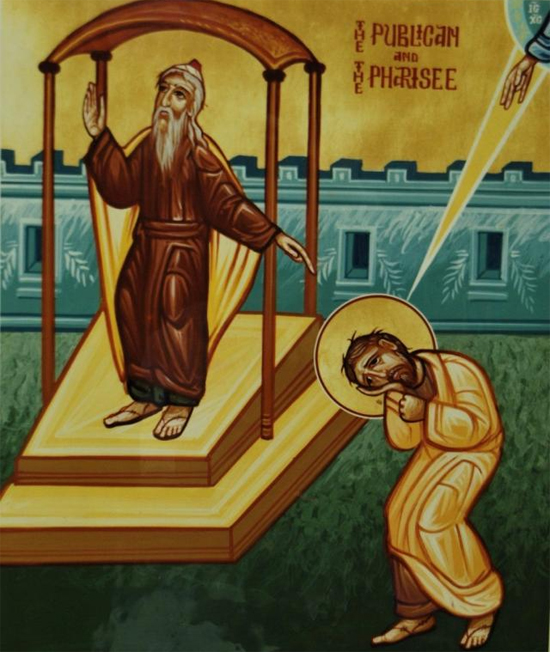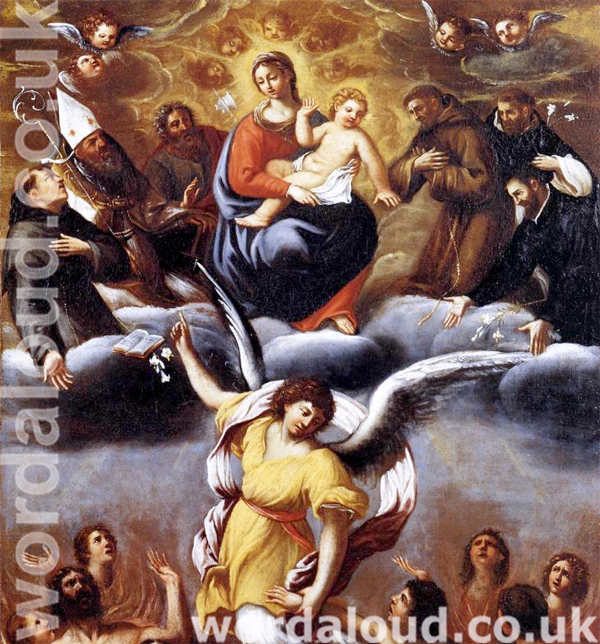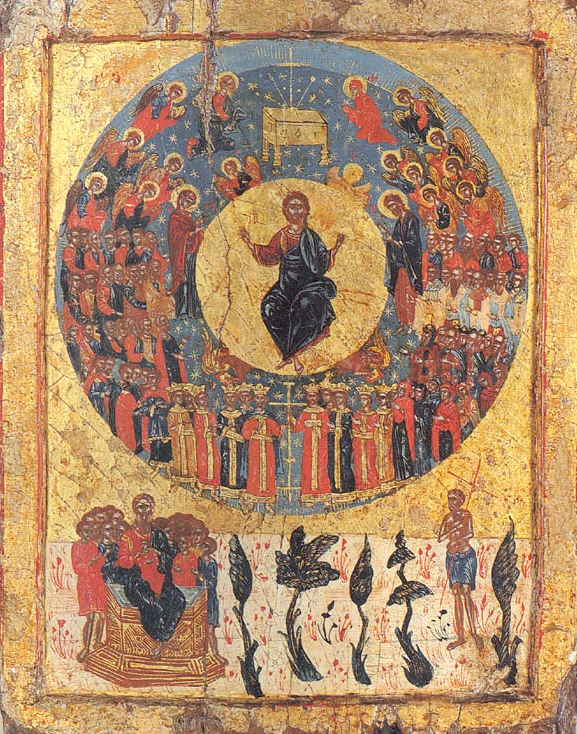Christian Art | Pharisee And Publican | Prayer With Jesus | King James Version Audio Bible
Matthew 23: 27-32 | Week 21 Ordinary Time, Wednesday | King James Audio Bible KJV
27 Woe unto you, scribes and Pharisees, hypocrites! for ye are like unto whited sepulchres, which indeed appear beautiful outward, but are within full of dead men’s bones, and of all uncleanness.
28 Even so ye also outwardly appear righteous unto men, but within ye are full of hypocrisy and iniquity.
29 Woe unto you, scribes and Pharisees, hypocrites! because ye build the tombs of the prophets, and garnish the sepulchres of the righteous,
30 And say, If we had been in the days of our fathers, we would not have been partakers with them in the blood of the prophets.
31 Wherefore ye be witnesses unto yourselves, that ye are the children of them which killed the prophets.
32 Fill ye up then the measure of your fathers.
Jesus’ critique of the scribes and the Pharisees continues in today’s Gospel verses. The accusation is constant: they are hypocrites. The imagery in part remains constant: these hypocrites put on outward shows of purity, and yet their hearts are corrupt and their behaviour is corrupt. This imagery now develops. Woe unto you! For you are as painted tombs, all white and purportedly pure and true on the outside, while within the dead flesh rots. In their souls, the scribes and the Pharisees are unclean. Ironically, they are in themselves a violation of the laws of purity. In their hearts, the scribes and the Pharisees carry spiritual death.
The hypocrisy and spiritual death of the scribes and the Pharisees are as one. There is a legacy of death, as of hypocrisy – as of false reading of God’s true communications to mankind. Even as the scribes and the Pharisees say that had it been theirs to do in the days of their fathers, then the blood of the prophets would not have been shed, so they condemn themselves by their own rule, now multiply ironic given their attack against Jesus. Jesus reflects upon the Law’s insistence of the son and the father being legally bound as he hurls the challenge at these hypocrites, who now want to kill Jesus: well then, be as you fathers, even as you say you would not have been to the prophets as they were; fill ye up the measure of your fathers.
There is so much anger and so much hatred in these verses. This does not flow from Jesus, but Jesus brings it to light. Jesus drives a sword into this well of denial and hatred – there is a purging action, a great release, which will require Jesus’ death to complete the letting forth. Here are people locked in hatred. There is hatred of the occupying powers, but more than this: hatred within people’s selves.
Jesus is the sacrificial lamb. In one aspect, Jesus goes meekly to the sacrifice. But we do not see meekness here. There are many aspects to Jesus which sit alongside one another. Here is righteous anger and active challenge. Here is God the Son saying to those who have perverted the way: look on the evil you inflict on my people, and in my name, in my Father’s name, in the name of God.
Jesus tells his accusers, the scribes and the Pharisees, that they witness against themselves. They represent hatred – Their little ways of reasoning begin from hatred, run through hatred and only end in hatred. Over and above this, there is Jesus’ love.
All that is in these Bible verses speaks to us about the here and now. Where there is hateful reasoning, hateful logic, hateful thinking, we are enabled by Jesus to know that his saving gift of himself on the cross is always available to us – that love is greater than hatred, infinitely so.
Concluding Prayer | Love Revealed By Jesus Christ
Lord, holy Father, faithful to your promise
you sent your Spirit
to bring together a people divided by sin.
Give us grace to foster unity and peace among men.
Through Christ our Lord.

![]()
King James Audio Bible Bible | Endnotes
What Does Jesus Mean By The Blood Of The Prophets?
The phrase ‘blood of the prophets’ refers to the shedding of the blood of those who were persecuted and put to death for their prophetic witness, particularly in the Old Testament and in the days of Israel’s apostasy.
The blood of the prophets is seen as a powerful testimony to the truth of God’s message and as a warning to those who reject it. The prophets were often persecuted and killed for speaking out against the sins of their people and calling them to repentance. Their blood is a testimony to the faith and to the gravity of sin.
The early Christian Church saw itself as continuing the prophetic tradition of the Old Testament, and many of its leaders and martyrs were persecuted and killed for their witness. The book of Revelation speaks of the ‘souls of them that were slain for the word of God, and for the testimony which they held’ (Revelation 6:9) and the ‘two witnesses’ who prophesy in the streets of Jerusalem and are killed by the Beast (Revelation 11).
In Christian theology, the blood of the prophets is often seen as a prefiguration of the blood of Christ, who was also put to death for his prophetic witness. Christ’s death on the Cross is seen as the ultimate act of prophetic witness, a sign of God’s love for humanity and a call to repentance.
An early account of persecution of a prophet is found in 1 Kings 18-19, which tells the story of Elijah and his confrontation with the prophets of Baal. Elijah challenged the prophets of Baal to a test, to see whose God was the true God. After the prophets of Baal failed to call down fire from heaven, Elijah called on the God of Israel, who answered with fire that consumed the burnt offering, the wood, the stones, and the dust. The people fell on their faces and cried out: ‘The Lord, he is the God; the Lord, he is the God.’ (1 Kings 18:39)
However, Queen Jezebel, who had brought the worship of Baal to Israel, was enraged by Elijah’s victory and threatened to kill him. Elijah fled to the wilderness and prayed that he might die, but an angel of the Lord came to him and provided him with food and water. Later, God spoke to Elijah in a still, small voice, encouraging him to continue his prophetic ministry and reassuring him that he was not alone in his struggle.
A notable example of the stoning of a prophet is found in 2 Chronicles 24:20-22, which tells the story of Zechariah, the son of Jehoiada the priest, who was stoned to death by the people of Judah during the reign of King Joash. Zechariah had rebuked the people for their idolatry and warned them of God’s judgment, but they refused to listen and stoned him to death in the court of the Temple.
Jesus also referred to the stoning of the prophets in Matthew 23:37, when Jesus lamented over Jerusalem, saying: ‘O Jerusalem, Jerusalem, thou that killest the prophets, and stonest them which are sent unto thee, how often would I have gathered thy children together, even as a hen gathereth her chickens under her wings, and ye would not!’
Further examples of prophets who were slain include:
- Isaiah: According to tradition, Isaiah was sawn in half during the reign of King Manasseh (2 Kings 21:16; Hebrews 11:37).
- Amos: According to tradition, Amos was killed by Amaziah, the priest of Bethel, who accused him of conspiring against the king (Amos 7:10-17).
- Micah: According to tradition, Micah was killed by King Joram, who ordered him to be put in prison and fed with bread and water until he died (2 Chronicles 18:7).
- Jeremiah: Jeremiah was beaten, put in stocks, and thrown into a cistern by the officials of King Zedekiah, and later imprisoned by the Babylonians (Jeremiah 20:1-3; 37:11-16).
- Uriah: Uriah was a contemporary of Jeremiah, who prophesied against Jerusalem and Judah. He was hunted down by King Jehoiakim, who had him killed and his body thrown into a common grave (Jeremiah 26:20-23).
- John the Baptist: John the Baptist was beheaded by King Herod Antipas, who was married to Herodias, the former wife of his brother Philip (Mark 6:14-29).
The prophets were faithful to God’s call and message, but they were rejected, persecuted, and killed by the people to whom they were sent to call to God.








